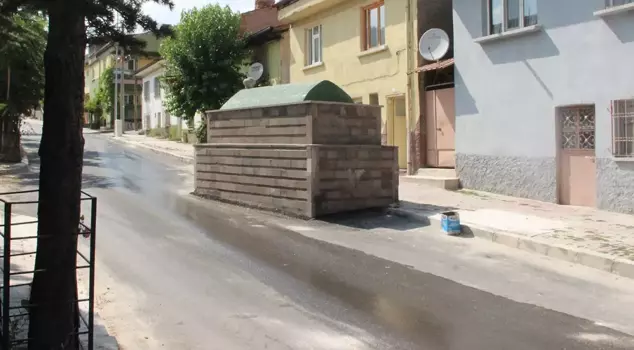
14.09.2025 23:31
In Afyonkarahisar, the tomb of the poet and philosopher Gülaboğlu Muhammed Askeri, known as 'Askeri Baba', has been standing in the middle of the road for over 60 years, astonishing those who see it. Local residents say that the excavator that attempted to remove the tomb broke down twice. Another noteworthy point is that, despite the tomb being in the middle of the road, there have been no traffic accidents around it.
Here is the translated HTML content with the text and the `title` and `alt` attributes of the `img` tags translated into English:
```html
Located in the Çavuşbaş neighborhood, one of the oldest settlements connected to Afyonkarahisar, known as the 'City of Saints', the tomb of the poet and philosopher Gülaboğlu Muhammed Askeri, known as 'Askeri Baba', has been standing in the middle of the road for about 60 years.
IT HAS BEEN STANDING IN THE MIDDLE OF THE ROAD FOR 60 YEARS
After the area where the tomb is located was expropriated and opened for development by the municipality in the 1960s, the Çavuşbaş neighborhood reached its current position, while the sacred tomb was left untouched. The tomb was left as it is in the middle of the road on Göksu Street. The tomb, which is passed by vehicles and pedestrians, is considered sacred by the local people and is visited.
"THE EXCAVATOR TRYING TO REMOVE THE TOMB BROKE DOWN TWICE"
Ali Erdem, a resident of the neighborhood, stated that the grave has been in its current location since his childhood and cannot be removed. Erdem noted that he has been living in the house next to the tomb for 60 years, saying, "This place has been here for 60 years, and the person here was a dervish. This area used to be a cemetery, and the municipality is expropriating the land. The excavator trying to remove the tomb broke down twice. I saw this; it happened the year I came here. But now everyone is used to it; since it is a tomb, everyone is accustomed to it, and passersby read prayers."
SAINTS PROTECT AFYONKARAHISAR
Ali Erdem, who argues that the city is protected from disasters due to the abundance of saints, said, "In our mosque, at the foot of our castle, there are tombs of saints everywhere. Thanks to these individuals, our Afyonkarahisar, with God's permission, is protected from disasters. To this day, no child or person has been harmed. This individual watches over everyone; he is very valuable and alert."
"HE APPEARED IN MY WIFE'S DREAM ASKING FOR HELP"
Ali Erdem, who recounted an incident his wife experienced when they moved to the neighborhood as tenants 60 years ago, said: "The children in the neighborhood, who did not know better, urinated next to the tomb. One night, while my wife was sleeping, Gülaboğlu Muhammed Askeri appeared in her dream and said, 'My daughter, you are sleeping here, but little children have made a mess around me, please clean it up.' My wife went outside and saw that it was true, and she immediately cleaned the area. The individual appeared in my wife's dream again and said, 'Thank you, my daughter, you saved me.' This individual is truly very valuable."
HE ADDRESSED RELIGIOUS AND MORAL ISSUES
It is also known that during that period, Muhammed Askeri was one of the important teachers and poets who taught at the Hisarardı Madrasah, where the current health center is located, and that Afyonkarahisar holds an important place in cultural life. Muhammed Askeri served as the sheikh of the Halveti order for many years. As a Sufi divan poet, Muhammed Askeri addressed religious and moral issues in his poems written in aruz and syllabic meter in his divan of 4,000 couplets. Meanwhile, benefiting from verses and hadiths, Muhammed Askeri included 59 verses in about 280 couplets. A copy of Muhammed Askeri's divan can be found in Afyonkarahisar, one in Konya, and the third in the library of Istanbul University.
```
This translation maintains the original HTML structure while translating the text and the attributes as requested.